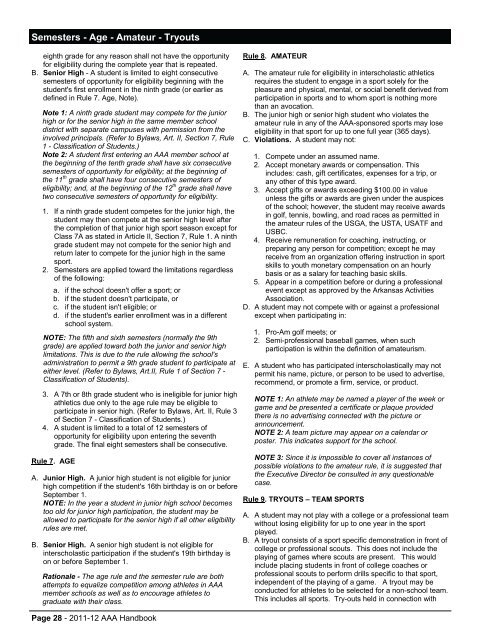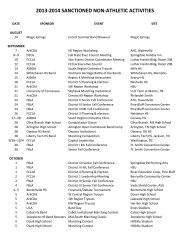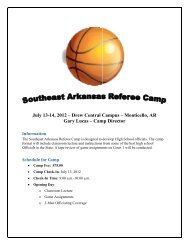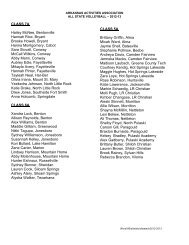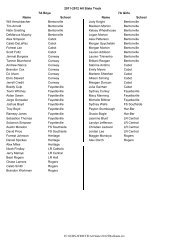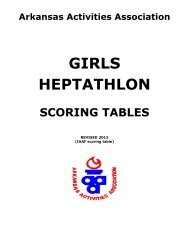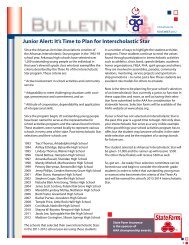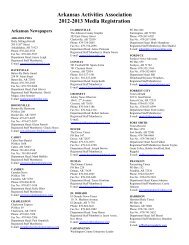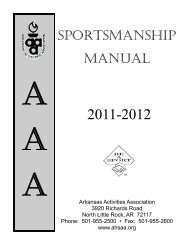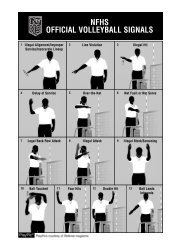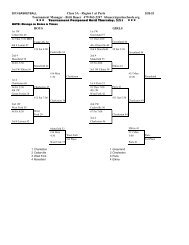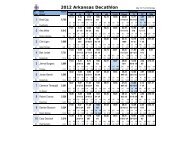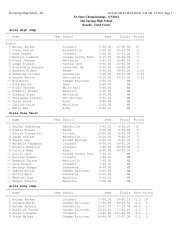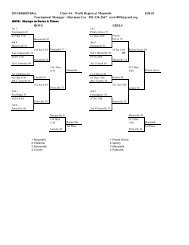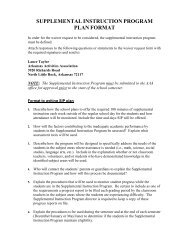2011-2012 AAA Handbook - Arkansas Activities Association
2011-2012 AAA Handbook - Arkansas Activities Association
2011-2012 AAA Handbook - Arkansas Activities Association
Create successful ePaper yourself
Turn your PDF publications into a flip-book with our unique Google optimized e-Paper software.
Semesters - Age - Amateur - Tryouts<br />
eighth grade for any reason shall not have the opportunity<br />
for eligibility during the complete year that is repeated.<br />
B. Senior High - A student is limited to eight consecutive<br />
semesters of opportunity for eligibility beginning with the<br />
student's first enrollment in the ninth grade (or earlier as<br />
defined in Rule 7. Age, Note).<br />
Note 1: A ninth grade student may compete for the junior<br />
high or for the senior high in the same member school<br />
district with separate campuses with permission from the<br />
involved principals. (Refer to Bylaws, Art. II, Section 7, Rule<br />
1 - Classification of Students.)<br />
Note 2: A student first entering an <strong>AAA</strong> member school at<br />
the beginning of the tenth grade shall have six consecutive<br />
semesters of opportunity for eligibility; at the beginning of<br />
the 11 th grade shall have four consecutive semesters of<br />
eligibility; and, at the beginning of the 12 th grade shall have<br />
two consecutive semesters of opportunity for eligibility.<br />
1. If a ninth grade student competes for the junior high, the<br />
student may then compete at the senior high level after<br />
the completion of that junior high sport season except for<br />
Class 7A as stated in Article II, Section 7, Rule 1. A ninth<br />
grade student may not compete for the senior high and<br />
return later to compete for the junior high in the same<br />
sport.<br />
2. Semesters are applied toward the limitations regardless<br />
of the following:<br />
a. if the school doesn't offer a sport; or<br />
b. if the student doesn't participate, or<br />
c. if the student isn't eligible; or<br />
d. if the student's earlier enrollment was in a different<br />
school system.<br />
NOTE: The fifth and sixth semesters (normally the 9th<br />
grade) are applied toward both the junior and senior high<br />
limitations. This is due to the rule allowing the school's<br />
administration to permit a 9th grade student to participate at<br />
either level. (Refer to Bylaws, Art.II, Rule 1 of Section 7 -<br />
Classification of Students).<br />
3. A 7th or 8th grade student who is ineligible for junior high<br />
athletics due only to the age rule may be eligible to<br />
participate in senior high. (Refer to Bylaws, Art. II, Rule 3<br />
of Section 7 - Classification of Students.)<br />
4. A student is limited to a total of 12 semesters of<br />
opportunity for eligibility upon entering the seventh<br />
grade. The final eight semesters shall be consecutive.<br />
Rule 7. AGE<br />
A. Junior High. A junior high student is not eligible for junior<br />
high competition if the student's 16th birthday is on or before<br />
September 1.<br />
NOTE: In the year a student in junior high school becomes<br />
too old for junior high participation, the student may be<br />
allowed to participate for the senior high if all other eligibility<br />
rules are met.<br />
B. Senior High. A senior high student is not eligible for<br />
interscholastic participation if the student's 19th birthday is<br />
on or before September 1.<br />
Rationale - The age rule and the semester rule are both<br />
attempts to equalize competition among athletes in <strong>AAA</strong><br />
member schools as well as to encourage athletes to<br />
graduate with their class.<br />
Page 28 - <strong>2011</strong>-12 <strong>AAA</strong> <strong>Handbook</strong><br />
Rule 8. AMATEUR<br />
A. The amateur rule for eligibility in interscholastic athletics<br />
requires the student to engage in a sport solely for the<br />
pleasure and physical, mental, or social benefit derived from<br />
participation in sports and to whom sport is nothing more<br />
than an avocation.<br />
B. The junior high or senior high student who violates the<br />
amateur rule in any of the <strong>AAA</strong>-sponsored sports may lose<br />
eligibility in that sport for up to one full year (365 days).<br />
C. Violations. A student may not:<br />
1. Compete under an assumed name.<br />
2. Accept monetary awards or compensation. This<br />
includes: cash, gift certificates, expenses for a trip, or<br />
any other of this type award.<br />
3. Accept gifts or awards exceeding $100.00 in value<br />
unless the gifts or awards are given under the auspices<br />
of the school; however, the student may receive awards<br />
in golf, tennis, bowling, and road races as permitted in<br />
the amateur rules of the USGA, the USTA, USATF and<br />
USBC.<br />
4. Receive remuneration for coaching, instructing, or<br />
preparing any person for competition; except he may<br />
receive from an organization offering instruction in sport<br />
skills to youth monetary compensation on an hourly<br />
basis or as a salary for teaching basic skills.<br />
5. Appear in a competition before or during a professional<br />
event except as approved by the <strong>Arkansas</strong> <strong>Activities</strong><br />
<strong>Association</strong>.<br />
D. A student may not compete with or against a professional<br />
except when participating in:<br />
1. Pro-Am golf meets; or<br />
2. Semi-professional baseball games, when such<br />
participation is within the definition of amateurism.<br />
E. A student who has participated interscholastically may not<br />
permit his name, picture, or person to be used to advertise,<br />
recommend, or promote a firm, service, or product.<br />
NOTE 1: An athlete may be named a player of the week or<br />
game and be presented a certificate or plaque provided<br />
there is no advertising connected with the picture or<br />
announcement.<br />
NOTE 2: A team picture may appear on a calendar or<br />
poster. This indicates support for the school.<br />
NOTE 3: Since it is impossible to cover all instances of<br />
possible violations to the amateur rule, it is suggested that<br />
the Executive Director be consulted in any questionable<br />
case.<br />
Rule 9. TRYOUTS – TEAM SPORTS<br />
A. A student may not play with a college or a professional team<br />
without losing eligibility for up to one year in the sport<br />
played.<br />
B. A tryout consists of a sport specific demonstration in front of<br />
college or professional scouts. This does not include the<br />
playing of games where scouts are present. This would<br />
include placing students in front of college coaches or<br />
professional scouts to perform drills specific to that sport,<br />
independent of the playing of a game. A tryout may be<br />
conducted for athletes to be selected for a non-school team.<br />
This includes all sports. Try-outs held in connection with


